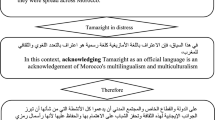Abstract
The relationship between ideology and language is analyzed by using quantitative linguistic methods to measure the thematic concentration of texts. The assumption is that totalitarianism and democracy represent radically different types of ideology and that this difference will be reflected in different levels of thematic concentration in texts of the same genre. The analysis focuses on the New Year speeches given by Czechoslovak and Czech presidents; these texts were chosen because they represent a relatively clearly delineated genre with a long tradition and because they are one of the most important outlets for the public expression of political opinions by the head of state. The results of statistical tests show that there exist significant differences between the thematic concentrations in the speeches of presidents from the totalitarian period and the period of democracy. The analysis also revealed that the largest differences in thematic concentrations were between the speeches made by the presidents representing the most ideologically polarized positions: the leader of the 1948 communist coup Klement Gottwald and the public face of the 1989 democratic Velvet Revolution Václav Havel.


Similar content being viewed by others
References
Al Ali, G.: Hero or terrorist? A comparative analysis of Arabic and Western media depictions of the execution of Saddam. Discour. Commun. 5, 301–335 (2011)
Baker, P.: Using Corpora in Discourse Analysis. Continuum, London (2006)
Charteris-Black, J.: Politicians and Rhetoric: The Persuasive Power of Metaphor, 2nd edn. Palgrave Macmillan, New York (2011)
Fairclough, N.: Language and Power. Longman, London (1989)
Hirsch, J.E.: An index to quantify an individual’s scientific research output. Proc. Nat. Acad. Sci. USA 102/46, 16569–16572 (2005)
Klemperer, V.: LTI. Lingua Tertii Imperii. Die Sprache des Dritten Reiches. Reclam, Leipzig (1947)
Köhler, R., Altmann, G.: Quantitative lnguistics. In: Hogan, C.P. (ed.) The Cambridge Encyclopedia of the Language Sciences, pp. 695–697. Cambridge, New York (2011)
Li, J.: Transitivity and lexical cohesion: press representations of a political disaster and its actors. J. Pragmat. 42, 3444–3458 (2010)
Orwell, G.: Politics and the English language. Horizon 13, 252–265 (1946)
Popescu, I.-I.: Text ranking by the weight of highly frequent words. In: Grzybek, P., Köhler, R. (eds.) Exact Methods in the Study of Language and Text, pp. 557–567. Mounton de Gruyter, Berlin (2007)
Popescu, I.-I., Altmann G.: Thematic concentration in texts. In: Kelih, E., Levickij, V., Matskulyak, Y. (eds.) Issues in Quantitative Linguistics, vol. 2, pp. 110–116. RAM Lüdenscheid (2011)
Popescu, I.-I., Altmann, G., Grzybek, P., Jayaram, B.D., Köhler, R., Krupa, V., Mačutek, J., Pustet, R., Uhlířová, L., Vidya, M.N.: Word Frequency Studies. Mouton de Gruyter, Berlin (2009)
Salama, A.H.Y.: Ideological collocation and the recontexualization of Wahhabi-Saudi Islam post-9/11: a synergy of corpus linguistics and critical discourse analysis. Discour. Soc. 22, 315–342 (2011)
Stubbs, M.: Grammar, Text, and ideology: computer-assisted methods in the linguistics of representation. Appl. Linguist. 15, 201–223 (1994)
Tannenbaum, D.: Totalitarism. In: Kurian, G.T. (ed.) The Encyclopedia of Political Science, pp. 1673–1674. CQ Press, Washington (2011)
Van Dijk, T.A.: Discourse semantics and ideology. Discour. Soc. 6, 243–289 (1995)
Van Dijk, T.A.: Ideology and discourse analysis. J. Polit. Ideol. 11, 115–140 (2006)
Van Leeuwen, T.: Politics and language critical discourse analysis. In: Brown, K. (ed.) Encyclopedia of Language and Linguistics, 2nd edn. pp. 290–294. Elsevier, Oxford (2006)
Wodak, R., Meyer, M. (eds.): Methods of Critical Discourse Analysis. Sage Publications, London (2001)
Acknowledgments
This work was supported by the Czech Science Foundation [grant number P406/11/0268], and by the Council of Czech Government [ESF OPVK 2.2 - The Inovation of the General linguistics and Theory of communication in cooperation with the natural sciences (CZ.1.07/2.2.00/28.0076) and ESF OPVK 2.3 - Linguistic and lexicostatistic analysis in cooperation of linguistics, mathematics, biology and psychology (CZ.1.07/2.3.00/20.0161)].
Author information
Authors and Affiliations
Corresponding author
Rights and permissions
About this article
Cite this article
Čech, R. Language and ideology: quantitative thematic analysis of New Year speeches given by Czechoslovak and Czech presidents (1949–2011). Qual Quant 48, 899–910 (2014). https://doi.org/10.1007/s11135-012-9811-3
Published:
Issue Date:
DOI: https://doi.org/10.1007/s11135-012-9811-3




